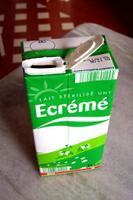The other day one of the local supermarkets (Intermarché) advertised a special on canettes -- young ducks. I went and bought two. A few days before I had seen a cooking show on TV where the chef explained what sounded like a fairly easy way to cook a whole duck without having duck fat splattering all over the kitchen (especially inside the oven).
Here's what you do. You need about 5 quarts of chicken broth or vegetable broth or a combination of the two. Put the whole duck into the cold broth and set it on the stove. Add some white wine, bay leaves, a carrot or two, an onion or two, some parsley stems, some black peppercorns, and maybe a few allspice berries. Along with whatever else you want to use to flavor the broth and the duck, and that you can strain out of the broth when you finish.
 Let the broth come up to a boil with the duck in it, and let is cook for 90 minutes or even two hours, just at a simmer. When the duck is done, carefully lift it out of the broth and set it on a wire rack over a pan or dish. Let it drain and dry thoroughly, for an hour or more.
Let the broth come up to a boil with the duck in it, and let is cook for 90 minutes or even two hours, just at a simmer. When the duck is done, carefully lift it out of the broth and set it on a wire rack over a pan or dish. Let it drain and dry thoroughly, for an hour or more.Meanwhile, peel and cut into chunks some potatoes, turnips, carrots, rutabagas, sweet potatoes, or whatever vegetables you like. Cook them until they are just done in some of the duck broth.
The final step is to brush or massage the poached duck with oil or fat (duck fat is best, of course). Preheat the oven to 400ºF (200ºC). Put the duck in a roasting pan and put the cooked vegetables all around it. Pour a cup or so of the duck broth into the pan. Put the pan in the hot oven for 15 minutes or more to let the duck turn golden brown and to give the vegetables a light crust. Keep an eye on it -- everything is already cooked and when it looks good it's ready to eat.
 Carve up the duck, serve up the vege-
Carve up the duck, serve up the vege-tables, and enjoy.
You can do the same thing with a turkey, a capon, or a chicken. The meat will moist and well-cooked, and the bird will look beautiful.









